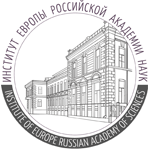International round table «The Role of Civil Society in the European Integration Process»
- 20 April 2016
On April 20, 2016, IE RAS held international round table «The Role of Civil Society in the European Integration Process», attended by scientists, social figures, representatives of Russian civil society, foreign experts. Opening the event, deputy IE RAS Director, Corresponding member RAS М.G. Nosov stressed the importance of the subject in discussion and urged to view the civil society experience in the EU in relation to the civil society forming in Russia.
Deputy IE RAS Director, Professor О.V. Butorina drew attention to the necessity of comprehensive study and objective assessment of civil society results in the EU. A welcome address was delivered by Head of IE RAS Department of Social and Political Studies, Dr. V.Y. Shveytzer. Head of Center for Social Development Problems, Dr. М.V. Каrgalova presented the report «Civil Society as One of Actors of Current European Integration Development». Reports were presented by: leading scientific associate IE RAS А.А. Kanunnikov – «The EU Experience in Building Dialogue with the Civil Society»; Director of the Institute of Federalism and Civil Society, Dr. А.N. Arinin – «Problems of Civil Society Development in the EU and Russia»; associate of National Development Institute Е.I. Novoselov – «Trade Unions in the Modern Civil Society of the EU member-states»; leading scientific associate IE RAS V.P. Zhuravel – «Interaction of Civil Society and State Authorities in the EU States and Russia in Counteracting Terrorism (Comparative Analysis)».
The discussion was shared by: deputy IE RAS Director, Corresponding member RAS V.P. Fedorov, IE RAS associates, representatives of the Russian Civil Society, heads of social organizations. Head of Rosa Luxemburg Foundation Office in Moscow Kerstin Kaiser marked the round table as the beginning of comprehensive dialogue on civil society development problems, and analysis of its institutions’ activity in Russia and Germany.
The event proved that studying the civil society development problems remains to be acute. There is great interest in Russia in the experience of civil society involvement in the EU integration processes. This is due to the fact that many researchers view such experience as one of possible examples for integration development in the post-Soviet area.



